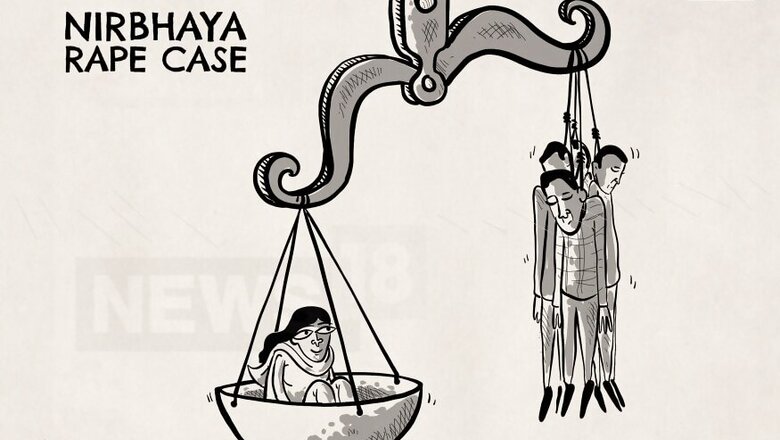
views
On the night of December 16, 2012, a 23-year-old paramedical intern was raped and brutally assaulted by a group of six people, including a juvenile, on a moving bus in Delhi. She died in hospital of internal injuries about two weeks later. The case sparked public protests across the country and led to strengthening of laws on violence against women.
Seven years since that dreadful event, there is still no closure. Although a fit case for fast-tracking, it still took four-and-a-half years for all the three courts of the country i.e., the trial court, the High Court and the Supreme Court, to hear and pass their verdicts in the case.
The juvenile, who is now an adult, was freed after spending three years in a reformatory; one of the accused committed suicide in jail; and the Supreme Court convicted and sentenced the other four to death on May 5, 2017. However, they are yet to be hanged till date.
For over two-and-a-half years, convicts Mukesh Singh, Pawan Gupta, Vinay Sharma and Akshay Thakur have been abusing the procedure of law to delay their execution. According to the law in force, each convict has a right to file a review petition within thirty days from awarding of the death sentence. However, the law also provides for condonation of the delay in such filing if the convict presents a bona fide reason for this.
In this case, all the four convicts filed their reviews on different dates along with delays. Mukesh, after waiting for a period of six months, filed his review on November 6, 2017. The petitions for Vinay and Pawan were filed within a few days from the conclusion of the hearing of Mukesh’s plea.
Also, Akshay’s appeal was not filed until the time the Supreme Court dismissed the review petitions of the other three convicts on July 9, 2018.
Finally, Akshay filed a review petition on December 9, 2019, almost two-and-a-half years after the Supreme Court awarded the death sentence and about 18 months after the Supreme Court dismissed the fellow convicts’ review petition.
Now, after a review petition is dismissed, a convict can file a curative petition within 30 days of the date of dismissal. The curative petition’s dismissal follows a mercy petition to the President of India. In this case, the petitions were filed by the convicts consecutively.
On January 14, 2020, a five-judge bench of the Supreme Court rejected the curative petitions filed of Mukesh Singh and Vinay Sharma. Mukesh, however, then filed a mercy petition before the President which was also rejected. Then, he challenged the rejection of the mercy petition before the Supreme Court. Further, after a huge delay, on January 28, 2020, the convict Akshay filed his curative petition before the Supreme Court, which was rejected.
The trial court in Delhi, in lieu of the pendency of the mercy petitions of Vinay Sharma and Akshay Kumar, suspended the death warrants. Subsequently, the President rejected the mercy petitions of the two convicts consecutively.
The Delhi High Court, on February 5, affirmed the stay on the execution of the death sentence of the convicts, while directing them to exhaust all legal remedies within a week. On the same day, the Centre and Delhi government challenged the order of the Delhi High Court before the Supreme Court that all the convicts should be hanged together.
The Supreme Court allowed the Centre to approach the trial court, seeking the issuance of a fresh date for the execution of the death sentence of the convicts. Additionally, the appeal against the rejection of mercy petition was rejected by the Supreme Court. The Delhi High Court on Wednesday dismissed Mukesh's plea that challenged a trial court order which rejected his claim that he was not in the national capital when the crime was committed.
The SC on Thursday rejected Pawan's curative petition, in which he claimed that he was a juvenile at the time of the crime in 2012 and that the lower courts had ignored this fact. He had previously filed a review petition on he same matter but that had been rejected by the top court.
In this case, incongruously, there has been postponement of the execution of these convicts constantly. The order for execution on March 20, 2020 was the third time when the date for execution was postponed.
Four days before the scheduled hanging, three of the convicts wrote a letter to the judges of the International Court of Justice, seeking a stay of their executions. In the letter, the death penalty has been termed as ‘barbaric and inhumane’.
They have alleged that the trial was faulty and the conviction was based on insufficient evidence. Many of the facts of the investigation that pertain to recording of dying declaration, recording of statements of witnesses under Section 161 of the CrPC, the medical examination, holding of the test identification parade, the manner and method of search and seizure and the procedure of arrest have been seriously doubtful in this case due to international media pressure.
However, it is noteworthy that the International Court of Justice has no power to adjudicate individual disputes within the sovereign states.
Poignantly, there has been a huge delay in granting justice to the fearless soul, Nirbhaya. It remains to be seen whether March 20, 2020 will finally ensure closure for the tragic event and provide justice to the victim and her family.
(The is an entrepreneur and women's rights activist. Views expressed are personal.)


















Comments
0 comment